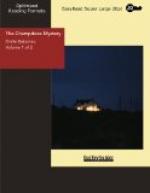“My father,” added the young collegian, “gives me all I ask for. I am certain of getting one, if not two prizes at the next examination; and when I have taken my degree, the Count de Mussidan has promised to make me his steward. What do you think that you will do?”
“I—I don’t know,” stammered Norbert.
“You will, I suppose, dig and toil in the fields, as your father has done before you. You are the son of the noblest and the richest man for miles round, and yet you are not so happy as I am.”
Upon the return of the Duke de Champdoce some little time after this conversation, he did not detect any change in his son’s manner; but the words spoken by Montlouis had fallen into Norbert’s brain like a subtle poison, and a few careless sentences uttered by an inconsiderate lad had annihilated the education of sixteen years, and a complete change had taken place in Norbert’s mind, a change which was utterly unsuspected by those around him, for his manner of bringing up had taught him to keep his own counsel.
The fixed smile on his features entirely masked the angry feelings that were working in his breast. He went through his daily tasks, which had once been a pleasure to him, with utter disgust and loathing. His eyes had been suddenly opened, and he now understood a host of things which he had never before even endeavored to comprehend. He saw now that his proper position was among the nobles, whom he never saw except when they attended Mass at the little chapel in Bevron. The Count de Mussidan, so haughty and imposing, with his snow-white hair; the aristocratic-looking Marquis de Laurebourg, of whom the peasants stood in the greatest awe, were always courteous and even cordial in their salutations, while the noble dames smiled graciously upon him. Proud and haughty as they were, they evidently looked upon his father and himself as their equals, in spite of the coarse garments that they wore. The realization of these facts effected a great change in Norbert. He was the equal of all these people, and yet how great a gulf separated him from them. While he and his father tramped to Mass in heavy shoes, the others drove up in their carriages with powdered footmen to open the doors. Why was this extraordinary difference? He knew enough of the value of crops and land to know that his father was as wealthy as any of these gentlemen. The laborers on the farm said that his father was a miser, and the villagers asserted that he got up at night and gazed with rapture upon the treasure that was hidden away from men’s eyes.
“Norbert is an unhappy lad,” they would say. “He who ought to be able to command all the pleasures of life is worse off than our own children.”




